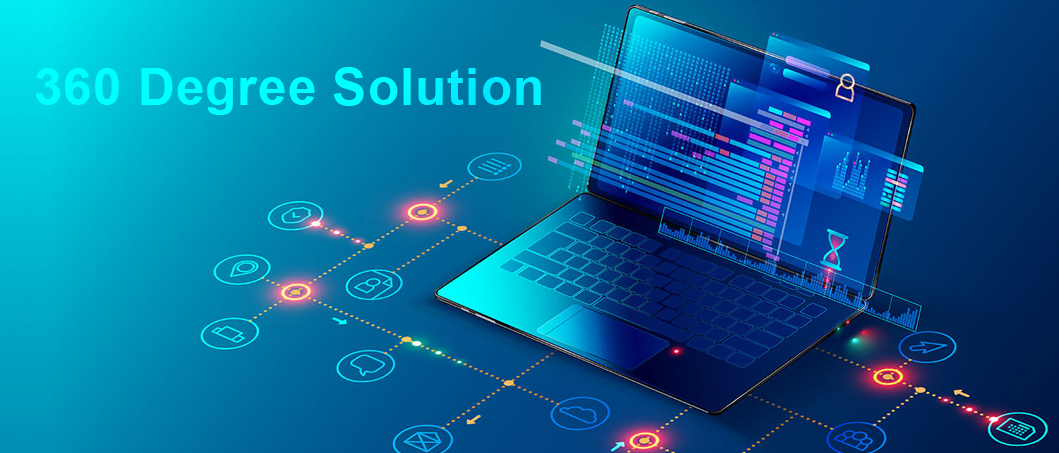
The Indian education system is one of the major industries in the country and is ever-evolving. Over the period of time, the sector has transformed significantly. While the coronavirus outbreak and pandemic-induced digital disruption have helped revolutionize the segment; it is due to tech advancements that education has become holistic!
360-degree learning: The new-age concept
The concept encompasses surroundings and all aspects of students’ experiences impacting education. In this model, learning is imparted via school environments, learning modules, and planning by teachers as well as delivering lessons. It also takes into consideration how students engage with their peers, the relevance of subjects, and how interactive as well as engaging the lessons are.
The ultimate aim is to ensure the learning experiences are engaging and effective. This concept works with an outcome-based approach and a multilevel integrated model. Using various elements such as colour, space, environment, objects, creative arts, and technology; the concept helps in offering holistic as well as new-age educational experiences to the students.
Schools embracing the holistic learning approach
In the present times, educational institutions do not just focus on offering quality education, but also hands-on and personalized learning. Studies have now become holistic and are helping in shaping the students for futuristic jobs. As a result, 360-degree learning has emerged as one of the recent trends in the industry.
Providing innovative and well-rounded educational experiences is the dire need of the hour for schools in order to enjoy a competitive edge in the market. This is where 360-degree learning steps into the picture! Schools no longer only focus on the explanation of concepts but also are making concerted efforts to offer hands-on learning. This paradigm shift in education has paved the way for a progressive form of learning. This is the reason why along with the approach the curriculum needs to be modified and aligned with the holistic model so as to offer the required practical exposure and prepare students for the future.
Automation: An essential element for 360 degree-based learning
Covid played a major role in schools adopting technology, especially automation in the form of ERP software. The sole objective was to ensure the continuance of learning experiences for the students, minimise the workload on the teachers as well as bridge the teaching-learning gaps. The trend has picked up pace significantly and automation has emerged to be a game-changer for schools.
The solution is playing a vital role in seamless school management as well as catering to the requirements of the students and the parents. Leveraging the power of ERP software, schools are empowered to work with a data-driven and outcome-based approach. They are able to manage the workflow seamlessly and offer superior educational experiences to the students. By undertaking the route of automation, schools are also enabling parents to stay up to date on their child's progress as well as on the ongoing activities on a real-time basis. They have gone paperless in the truest sense due to automation! This new-age technology has helped bring parents closer to their children's school life. Be it online fees collection, learning management, communications with parents, or report card analysis for gauging the student’s performance as well as generation; automation is taking over various core responsibilities in schools.
The adopting is happening at exponential levels and it is expected that automation will emerge to be the new normal for schools. This trend was highlighted by Modor Intelligence in its recent study which states that the global school ERP market size was valued at $8.05 billion in 2020 and is anticipated to reach $18.82 billion by 2026 growing at a CAGR of 16.2 per cent. The research also points out that the Apac region especially India is the fastest-growing market. It further states that schools are promptly embracing automation and it will be an essential element for them in the times ahead.
Education is now easily available and accessible all thanks to technology. Schools understanding that innovation is the dire need of the hour are now relying on a 360-degree learning approach. The holistic model of education leverages the power of ed-tech platforms and technology especially automation and ERP software to offer personalised and customised educational experiences to the students. As a result, learners now have access to not only theoretical explanations but also the requisite practical learning and the real-world application of the concepts. The 360-degree approach is helping in the holistic development of the students prepping them for the future. Hence, it is gaining prominence and will step up to be a critical pillar of the education industry.
Harnessing the potential of automation, schools can effectively communicate with parents and other staff members in real-time via multiple channels. The ERP software regularly updates parents about school circulars and notices as well as offers instant message delivery report acknowledgment. The messages can be personalized using varied data formats. They can also be customized for the parents to select a particular class and section and have access to the desired information. The communications management ability of the automation-enabled platforms with their multi try mechanism offer cutting-edge services of 100% message delivery and reduced communication gaps.
Disclaimer: The views expressed in the article above are those of the authors' and do not necessarily represent or reflect the views of this publishing house




